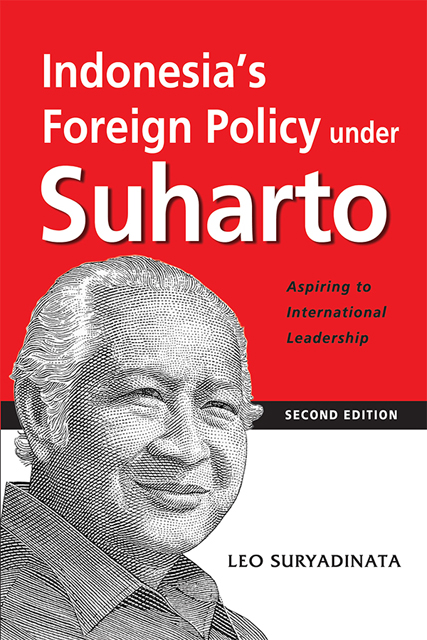Book contents
- Frontmatter
- Contents
- Preface to the Second Edition
- Preface
- Acknowledgements
- Introduction: Suharto’s Foreign Policy
- 1 Determinants of Indonesia’s Foreign Policy: In Search of an Explanation
- 2 Indonesia’s Foreign Policy before the New Order: In Search of a Format
- 3 Indonesia’s Foreign Policy during the “New Order” (I): The Rise of the Military
- 4 Indonesia’s Foreign Policy during the “New Order” (II): The Assertive Role of the President
- 5 Indonesia’s Relations with the ASEAN States: Regional Stability and Leadership Role
- 6 Indonesia’s Relations with Australia and Papua New Guinea: Security and Cultural Issues
- 7 Indonesia-China Relations: Ideology, Ethnic Chinese and the President
- 8 Indonesia-Vietnam Relations and the Kampuchean Issue: The Security Factor
- 9 Indonesia-Superpower Relations: Economic and Non-Economic Factors
- 10 Indonesia, the Middle East and Bosnia: Islam and Foreign Policy
- 11 Indonesia, the Non-Aligned Movement and APEC: In Search of a Leadership Role
- Conclusion: To Lead and Not to Be Led
- Postscript: Indonesia’s Foreign Policy from the Fall of Suharto to Joko Widodo: Still Aspiring to International Leadership?
- Bibliography
- Appendices
- Index
2 - Indonesia’s Foreign Policy before the New Order: In Search of a Format
Published online by Cambridge University Press: 01 September 2023
- Frontmatter
- Contents
- Preface to the Second Edition
- Preface
- Acknowledgements
- Introduction: Suharto’s Foreign Policy
- 1 Determinants of Indonesia’s Foreign Policy: In Search of an Explanation
- 2 Indonesia’s Foreign Policy before the New Order: In Search of a Format
- 3 Indonesia’s Foreign Policy during the “New Order” (I): The Rise of the Military
- 4 Indonesia’s Foreign Policy during the “New Order” (II): The Assertive Role of the President
- 5 Indonesia’s Relations with the ASEAN States: Regional Stability and Leadership Role
- 6 Indonesia’s Relations with Australia and Papua New Guinea: Security and Cultural Issues
- 7 Indonesia-China Relations: Ideology, Ethnic Chinese and the President
- 8 Indonesia-Vietnam Relations and the Kampuchean Issue: The Security Factor
- 9 Indonesia-Superpower Relations: Economic and Non-Economic Factors
- 10 Indonesia, the Middle East and Bosnia: Islam and Foreign Policy
- 11 Indonesia, the Non-Aligned Movement and APEC: In Search of a Leadership Role
- Conclusion: To Lead and Not to Be Led
- Postscript: Indonesia’s Foreign Policy from the Fall of Suharto to Joko Widodo: Still Aspiring to International Leadership?
- Bibliography
- Appendices
- Index
Summary
Introduction
Using the various “determinants” discussed above as a backdrop, this chapter examines Indonesia’s foreign policy before Suharto came to power. What was its nature? What were the major issues? Who made the policies? A brief study of Indonesia’s foreign policy before the New Order is important because Suharto’s foreign policy, to a certain extent, has shown continuity with that of Sukarno.
Various factors which have been identified in the previous chapter, such as leaders’ perceptions of Indonesia’s territory and role, the dominant political culture and Indonesia’s capabilities, have affected Indonesia’s foreign policy throughout the period from the revolution to the Suharto era.
Pre-New Order policy can be divided into at least three periods: the revolutionary period (1945-1949), the Liberal Democracy Period (1950-1958), and the Guided Democracy Period (1959-1965).
The Revolutionary Period (1945-1949)
Before considering Indonesia’s foreign policy during the revolutionary period, it is necessary to ask whether there was a foreign policy before December 1949. Some observers argue that, prior to that time, Indonesia was not an independent state because the Dutch had not transferred sovereignty. Accordingly, prior to 1949-1950, Indonesia did not have any foreign policy.
Indonesian nationalists argue that Indonesia was already a sovereign state when independence was declared. A state is defined in terms of independent government (a republic), clear boundaries (those of the Dutch East Indies, although before December 1949 the nationalists were not in full control) and a population (Indonesian peoples who lived in the Dutch East Indies). Moreover, when independence was proclaimed, the Republican Government was the only government because the Japanese had capitulated on 15 August 1945, and Allied troops only arrived a few weeks later. After mid-September, the Allied Forces led by the British intended to restore Dutch rule in Indonesia. Their actions brought them into physical conflict with Indonesians who were then struggling for their independence. Although the republic was initially confined to a limited area and was not recognized by all the major powers, it was recognized by some small states (in the Middle East) and by some major powers (the Soviet Union in 1948, before the Dutch transfer of sovereignty). Since Indonesia was already a state in 1945, its foreign policy also began in that year.
In any case, the fact remains that the Republicans were able to establish a foothold in Java and expand their influence.
- Type
- Chapter
- Information
- Indonesia's Foreign Policy under SuhartoAspiring to International Leadership, pp. 22 - 33Publisher: ISEAS–Yusof Ishak InstituteFirst published in: 2023



